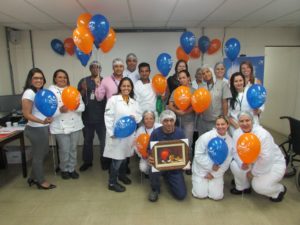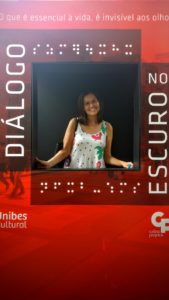Inclusion in the Air – A True Eye-Opener
Hello! My name is Nathália and I work for the LSG Group in Latin America as a Product Marketing & Communications Manager. I would like to share with you the truly eye-opening experience I recently had during an inclusion workshop at our São Paulo (GRU) unit.
“Inclusão no Ar” – Inclusion in the Air
Last January in Brazil, we launched a project called “Inclusão no ar” (Inclusion in the air) in order to promote inclusion over the next two years among our LSG Group employees. The idea of the project is to deconstruct myths and create a more equal-opportunity work environment. The project was designed in response to an inclusion law that had been passed in Brazil, but has expanded and taken the law as an opportunity for learning and growth for all employees.
The project includes a set of workshops led by Consolidar Dorina Consulting Company, experts in including people with disabilities in the workplace and social spaces. I was invited to take part in one of these workshops designed to promote inclusion in the corporate environment and offer tips about how to improve positive interaction with colleagues who live with disabilities.
With only that information at hand, and very little previous experience in my private or professional relationships with people who have disabilities, I came to the workshop not knowing exactly what to expect. In general, I thought the workshop would inform us about general “common sense” tips on how to relate to colleagues with disabilities. I even thought that the four hours planned for the workshop would, perhaps, be too much.
An Eye-Opening Workshop
 The workshop was extremely dynamic – much more so than I expected – and opened my eyes to the many difficulties and barriers faced by disabled colleagues. It also made me more keenly aware of the general prejudice that my colleagues with different types of disabilities face on a daily basis. During the session, we were asked to perform various daily tasks with certain restrictions (not using one of our hands, for example). We had never had to attempt to perform the same tasks without full mobility and it really helped us put ourselves into our colleagues’ shoes and experience the tasks like they do. Afterwards, we had a much better understanding of the insecurities, fears, and frustrations that living with different types of disabilities can cause.
The workshop was extremely dynamic – much more so than I expected – and opened my eyes to the many difficulties and barriers faced by disabled colleagues. It also made me more keenly aware of the general prejudice that my colleagues with different types of disabilities face on a daily basis. During the session, we were asked to perform various daily tasks with certain restrictions (not using one of our hands, for example). We had never had to attempt to perform the same tasks without full mobility and it really helped us put ourselves into our colleagues’ shoes and experience the tasks like they do. Afterwards, we had a much better understanding of the insecurities, fears, and frustrations that living with different types of disabilities can cause.
We were asked to examine our own prejudices regarding the most recurring disability types. It caused a lot of the participants, myself included, to look at ourselves in the mirror and humbly understand that we should not judge without asking and gathering information beforehand.
We learned that most people actually do want to assist a person with disabilities, but lack information on how to properly do so. Sometimes, this can create a negative response or make people afraid to help due to a lack of knowledge on how to do it properly. In order to address these situations appropriately, we were given many tips on how to behave in various similar circumstances.
My Takeaways

The main things I took with me from the workshop were that there are many types of disabilities and they differ on such a personal level. Only one generalization applies – you have got to get to know a person in order to actually understand their situation. Also, I learned that we should not be afraid to address someone directly – if I want to be helpful and do not know how, I should just ask the person directly if they need any assistance and how I could help. An important point that I learned, or was reminded of, is to never feel sorry for a person with a disability, but treat them as an equal with different obstacles in their life, as we all have.
Perhaps the most important thing I learned was to always remember to practice empathy. Putting ourselves in the other person’s shoes is always the best way to start truly understanding how they feel, where they may need assistance and where they will definitely excel. And that applies to everyone!
I left the workshop wanting more in-depth information on the topic. So much so, that the following week I went to visit the exposition “Diálogo no Escuro” (dialogue in the dark) in São Paulo, based on the German concept “Dialog im Dunkeln”. During the visit, I was invited to go through a path into different scenarios in complete and total darkness to experience regular daily experiences as a person with a visual disability.
Together, both experiences added a lot to my understanding and made me much more aware and empathetic to others around me. I definitely recommend both experiences to everyone!